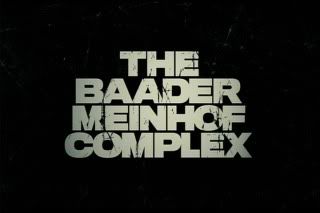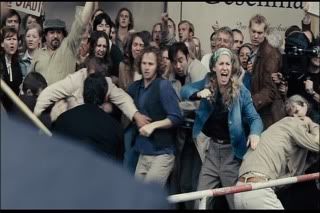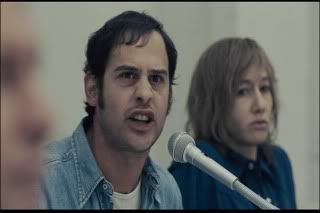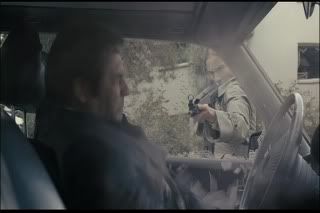
I’m continually reminded that the 60s were the 60s all over. They were a time of revolt and revolution in all countries, not just the US--in fact, while the US is the country many of us think of when the 60s are mentioned, it’s quite possible that their culture revolution was the least important of all. But hey, what do I know, I’m just reviewing a movie.

While Germany in the 60s had its fair share of free love hippies, THE BAADER MEINHOF COMPLEX follows the lives of the violent, ugly cousins of the hippies: the Marxist revolutionaries. These particular revolutionaries were known as the Baader-Meinhof Gang, when they were thought of as more of a criminal organization, and later as the Red Army Faction (or RAF), a communist “urban guerrilla” group. The film shows how the group forms out of the meeting of young idealists--notably, Andreas Baader (Moritz Bleibtreu of RUN LOLA RUN)--and the Leftist journalist Ulrike Meinhof (Martina Gedeck). As it was with the youth movements found elsewhere on the planet, the young people of Germany were rebelling against the old, corrupt culture of their parents. Unlike the youth of the rest of the world, their parents were Nazis.
One can sympathize with their need to lash out, to take an active role in countering what they saw as the “bad old ways”; police brutality and American imperialism seemed to them just another instance of the evils that the older generation had committed. The problem, of course, was method. How, you might ask, do you lash out at a system, since a system is, necessarily, not a material object or person? The answer is to engage in what some call “urban guerrilla warfare” and what others would call “terrorism.”

And so the film follows the Baader Meinhof gang as they wage their urban warfare, and one by one are arrested by the police and put on trial. The first part of the film shows us their formation and their “terrorist” acts; this section of the film is fast-moving and action-packed, with robberies and gunfights and nudity and fucking and the like. The second half of the film details the capture of the main members of the game and their long imprisonment, accompanied by a good deal of inter-personal conflict among the members. This part is (necessarily) much slower.
Personally, I feel the film’s chief strength (aside from illuminating a piece of important German--and world wide--cultural history I knew very little about) was director Uli Edel’s handling of the action scenes. A key example of this is one of the film’s early scenes, which involves a riot incited by the visit to Berlin by the Shah of Iran. Dozens of actors--student protesters, members of the shah’s security detail, police officers, and innocent bystanders--are included in the scene, and various (important) events are edited together. A lesser director would end up presenting the audience with a bit of a mess, or necessarily foreground the actions of a select few while using the rest of the extras to fill space. Edel, on the other hand, is able to present the audience with a scene that is easy to follow, and which gives you a good idea of the riot as a whole, not just as a composite made up of different parts. And he does it all without utilizing that annoying shakey-cam, fast-editing effect that so many directors and editors seem to use to create the feeling of frenetic energy. Some American action directs would be well served to check it out.

Perhaps the decision made by the filmmakers, to present a fairly historically-accurate portrayal of events, may make the film less accessible. It’s not only that the majority of its non-German audience will be unfamiliar with the events that inspired the film, but that, in keeping with the true story of how events unfolded, the film necessarily introduces new characters late in the film, while including various characters throughout who can only be briefly introduced before exiting the film (for various reasons). A typical dramatization of events would involve creating composite characters, who can stand in for two or more figures, and so giving the audience fewer names and faces to know and remember. And so, dramatic effect may, in some ways, be sacrificed for realism.
THE BAADER MEINHOF complex is a fascinating film, and while I wouldn’t recommend it to anyone who isn’t interested in the subject matter, I’d wholeheartedly endorse it to anyone keen on Leftist movements, the 60s, urban warfare, etc., etc.










3 comments:
So I took that quote at the start from Wikipedia. So fucking sue me.
Baader-Meinhof Complex is a fascinating film, one of the better films to come out of Germany in recent years -- though, really, all of German cinema has been on fire ever since Lola Rennt, but that's beside the point really. What I liked about this film was how objective it remained despite its somewhat alluring subject matter. The RAF is not romanticized or glamorized. Neither are the agents chasing them. Everyone is given a fair shake. I also loved the casual nudity and well-choreographed action scenes (two things we don't get much of anymore in America).
I wrote quite a few term papers on left-wing terror movements during my college tenure as a Poli Sci major.
I watched this movie after hearing your faint praise at other message boards and I was pretty impressed with the film.
Post a Comment